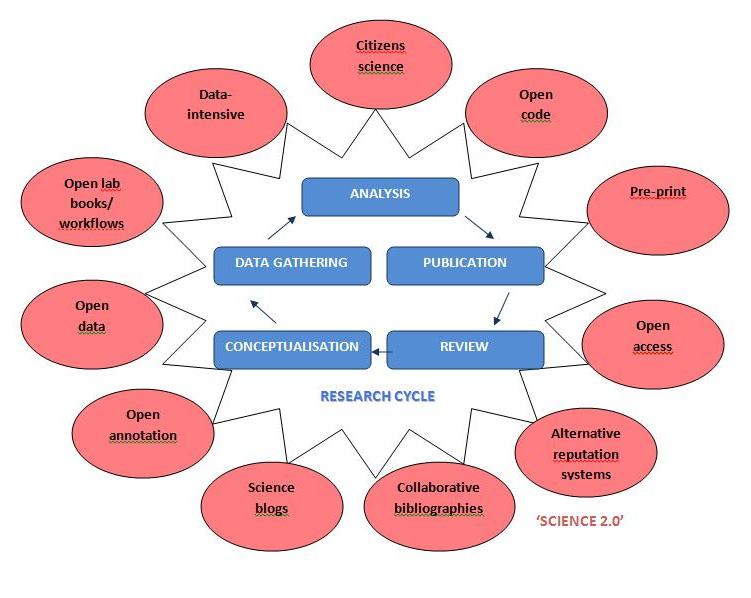As anyone who is a member knows, Science 2.0 was founded in 2006 on four fundamental concepts: modernizing collaboration, participation, communication and publication. This synthesis was in the works for a while, of course. Before we came up with Science 2.0, open access publication had already been successful, with arXiv, BMC and PLOS all taking journals out of the subscription world and making them available to everyone. Citizen science participation has forever thrived in paleontology, astronomy and many other fields. We immediately made a difference in communication by opening up a platform for researchers to talk directly with the public, an open access for science journalism, and became the world's largest independent science writing community, with tens of thousands of members from almost every country.
The fourth aspect has been tougher. How do you encourage collaboration when each lab at a university is effectively its own corporation competing against other similar corporations for funding? Our legacy system in math and science rewards people first to publish in a specific way so even a preprint can be a real negative but we know it can work. Why not extend that to collaboration?

Credit: EC
Because there is not a lot of money in it, there is a cultural issue. American funding agencies only want to fund progress through academia or perhaps well-connected non-profits, which blocks out some of the most creative minds in the world. Science 2.0 has been an expensive endeavor, over $1 million spent in the past 8 years so far with no NSF involvement, even as they have spent millions of dollars on other efforts that have failed - it's slow going that way.
But the change is coming because it must. The EU estimates that 90 percent of all available data in the world has been generated in the past two years, and output is growing at a rate of 30 percent per year.
They're asking everyone, Europeans, Asians, Americans, everyone who cares about how science can continue to push forward in a world where we want solutions to problems faster. to participate in a dialogue. They primarily want to strengthen the competitiveness of European science and research, of course, but it's a global science world now. If it's good for Europe, it's good for America too.
European Research, Innovation and Science Commissioner Máire Geoghegan-Quinn said, “Science 2.0 is revolutionising the way we do science – from analysing and sharing data and publications to cooperating across the globe. It is also allowing citizens to join in the search for new knowledge. The whole scientific process is becoming more transparent and efficient, but this also poses questions about integrity and quality – so we want to hear people's views on how we can guarantee that Science 2.0 develops in a way that is positive for Europe."
The European Commission is already doing some aspects of Science 2.0. Open access is mandatory for research under Horizon 2020, the new EU research and innovation program and a Pilot on Open Research Data has also been launched. Through its research programs, the EU also funds a number of citizen science projects and supports some of the e-infrastructure that makes the future of Science 2.0 possible.
The deadline for responses is 30 September 2014. You can also follow what people are saying on social media, using the hashtag #science20.





Comments